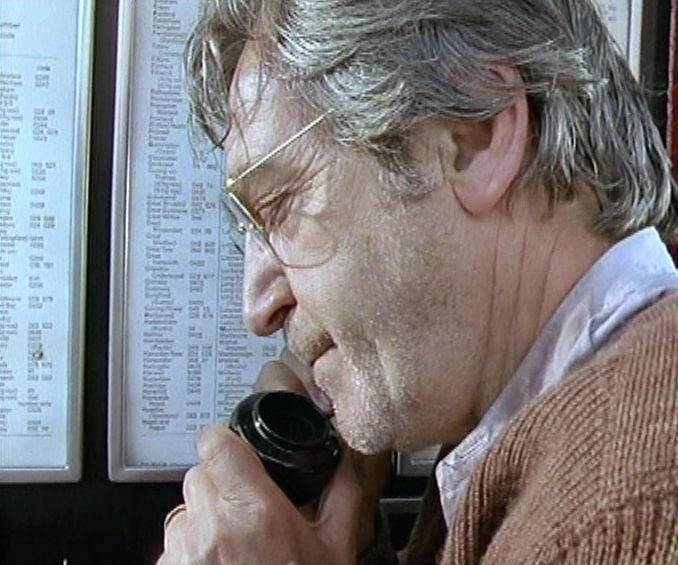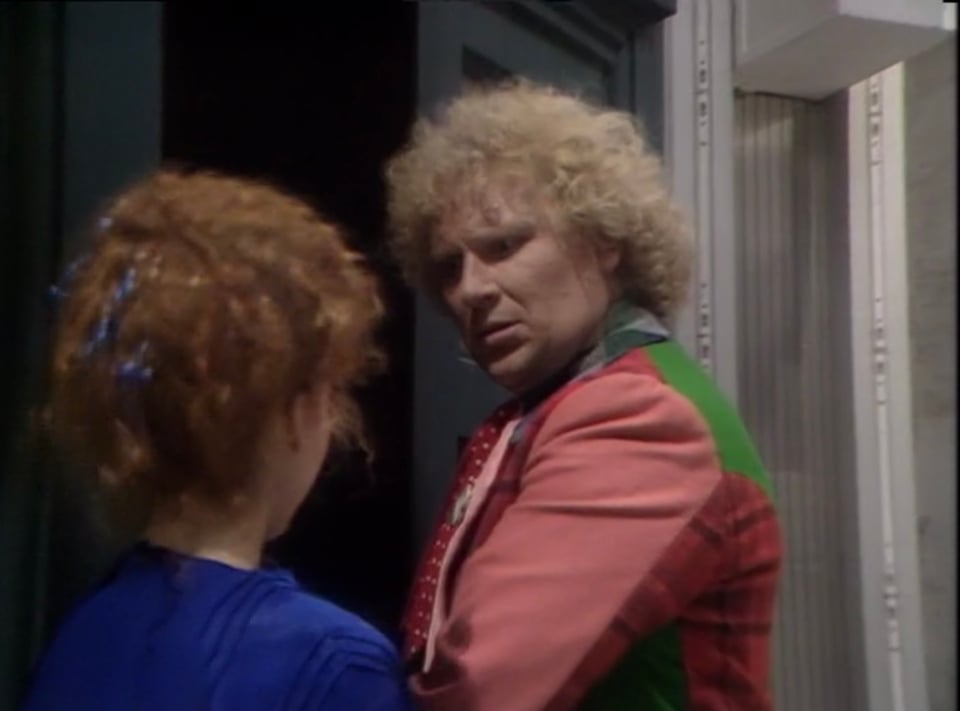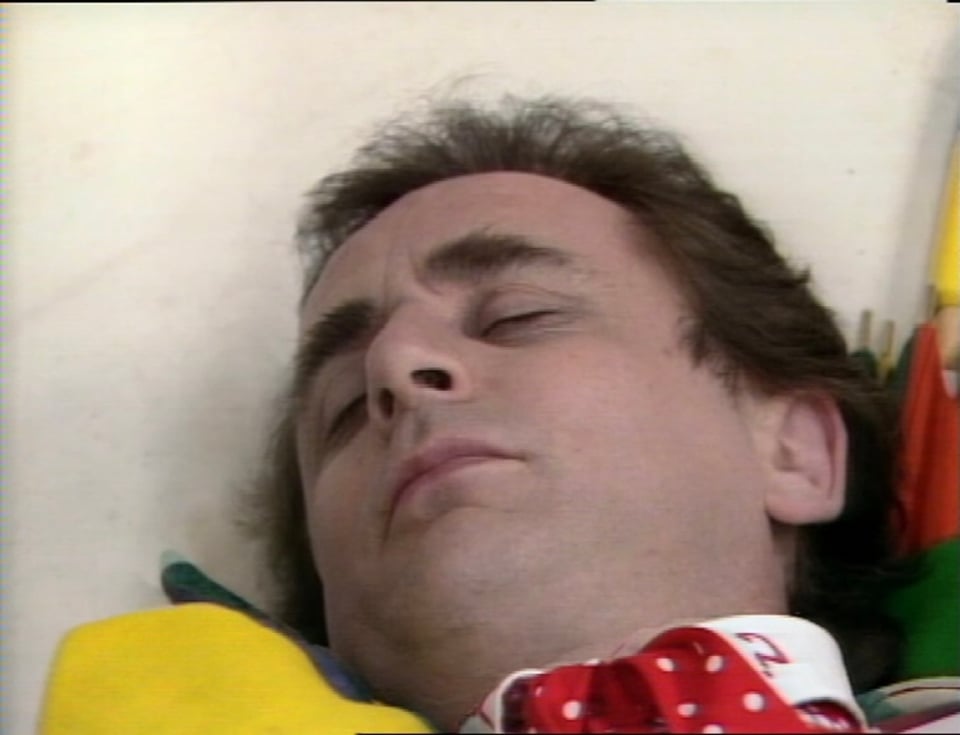The Trial of a Time Lord Epilogue: "The Final Countdown"
"I guess there is no one to blame... Will things ever be the same again? It's the Final Countdown."
Doctor Who was dead, to begin with. There is no doubt whatsoever about that. The series was cancelled in February 1985 and only extraordinary, and probably career destroying public action on the part of its then producer John Nathan-Turner, saw it commissioned for a 1986 series against the wishes of BBC hierarchy, in order to avoid a public scandal.
The 1986 series which followed was not a success in the ratings, and getting it to screen destroyed the working relationship, never good, between Nathan-Turner and his long serving script editor / head writer Eric Saward. Nevertheless, a 1987 series was commissioned on 19th August. Or rather, it had already been commissioned on 19th August, as that date is actually before any of the 1986 series reached the screen.
Had the decision been taken later, it's possible Doctor Who might not have been renewed at all, and perhaps the hard-to-walk-back public commitment to another series for 1987 prompted some of the odder events of that Autumn. In October, while the 1986 series was mid transmission, Doctor Who's creator Sydney Newman submitted a proposal for a revamp of the series, having been invited to do so by BBC One Controller Michael Grade. It went no further, reportedly after a lunch meeting between the two went badly. Although it is perhaps possible the gesture-prone Grade had no intention of taking Newman's ideas seriously from the off.
Those ideas of Newman's for revamping Doctor Who for 1987 are a mix of the predictable, the inspired and the out-of-step with 1980s television. For example, he suggested that Patrick Troughton be asked to return to the role of the Doctor for a period, and for him to then be succeeded in the part by a woman. In retrospect this is disorienting on two distinct fronts. We all now know that Troughton did not have long to live, dying of a sudden heart attack in March 1987. But in late 1986 he was still a busy working actor. So busy that he left over a dozen television appearances behind to be transmitted posthumously. In addition to the five appearances across two series he made in January 1987 alone.

It makes sense for Troughton, not only the one of the two Doctors that Newman had had a hand in casting still living, but also an actor conspicuously working in British television, to be given a nod. As to his successor, well, it would take another thirty years for the role to be actually offered to a woman, but when it finally was, Newman's own long ago approval of the idea carried some media weight. Less inspired were Newman's ideas for companions (a pre-teen brother and sister) or stories (he favoured a more educational slant to the series, adventures inside a human body or trying to land a NASA shuttle).
Another Doctor Who old hand, Terrance Dicks, the series' former script editor (1968 to 1974) and by 1986 a BBC staff producer himself, would later relate, semi-privately, that there was a point in 1986 where he thought he might be offered the job of producing Doctor Who. Even that he had a meeting with Head of Drama Jonathan Powell about setting up a further meeting to discuss the idea, only for that second meeting to become a brief discussion of something else entirely, leaving him nonplussed.
Putting these events together, we might conclude that BBC Drama, again committed to making Doctor Who for at least another year, was looking for a new way to make a series it was tired of and confused by. Some sort of relaunch without Nathan-Turner (Saward had already resigned from the BBC) and perhaps without the Doctor he had cast: Colin Baker.
Certainly Nathan-Turner was under the impression that he would not be producing the 1987 series, and as such had done little or no work on preparing it, not wanting to tie his successor's hands. Although whether the chaos of the 1986 series would have allowed him to plan for the future even had he wanted to is another matter.
On the 21st of October, Nathan-Turner was instructed by Powell, himself seemingly acting on orders from Grade, to not renew Baker's contract for the 1987 series. Nathan-Turner was also told that he would have to inform the actor of their decision. David Reid, Powell's predecessor as Head of Drama Serials and Series, and a mentor to both Nathan-Turner and Powell called this "an extraordinary thing to happen" when informed about it decades later, noting of Grade's involvement; "The Sixth Floor just didn't get involved in casting decisions."
In return for de facto firing Baker, Powell guaranteed Nathan-Turner would be moved to another programme within Drama Serials. Nathan-Turner did as he was told, expecting it to be his last act as producer of Doctor Who and, he later said, seeing some glimmer of logic to it. The new producer might want to cast their own Doctor, after all.
In recent years Peter Davison, Colin Baker's predecessor as Doctor Who and at the time the star of BBC Drama’s A Very Peculiar Practice has often voiced his firm opinion that it was Nathan-Turner that Powell wanted rid off. Not Baker. Powell would have asked Nathan-Turner to sack whoever had been in the part, because they would have been cast by Nathan-Turner, and Powell anticipated the producer refusing and then either resigning in protest or being sacked for refusing carry out a direct instruction from higher management. This would resolve the problem as Powell saw it. It is also the only reason for invoking the sheer executive level of Grade in the process of instructing Nathan-Turner to do sack Baker.
But Nathan-Turner's acquiescence created a new problem. Powell has been (and remains) unsparing in his criticism, personal and professional, of Nathan-Turner, and the disadvantages of having Nathan-Turner at the BBC but not on Doctor Who were two-fold. A producer Powell thought more of than JNT would be being wasted making Doctor Who, while Nathan-Turner would be messing up a series Powell thought more of than he did JNT's old show.
Making Nathan-Turner an offer he couldn't accept would have at least spared Powell the job of finding the producer another series to work on. But then he did accept it. If this truly was a bit of brinkmanship on Powell's part, he had perhaps underestimated JNT's willingness to humiliate himself in order to retain his BBC staff producer status. Or simply his need to pay his mortgage. As Colin Baker would later comment, and with staggering magnanimity, “He [John] had got to work! We've all go to work.”
Whatever the motivations of Nathan-Turner or Powell, neither emerges well from any plausible interpretation of this interaction. But in almost any imaginable event, Powell emerges the worse. (Remarkably, Nathan-Turner and Baker's friendship survived this attempted manipulation of it.)
Perhaps, though, that was the idea behind approaching Terrance Dicks. Powell thought little more of the Classic Serial strand than he did Doctor Who. Dicks would later note that the unanticipated success of his (excellent) adaption of Oliver Twist in 1985 had, he'd later been told, saved Classic Serial itself from the axe that year. If Nathan-Turner moved to Classic Serial and Dicks to Doctor Who, you'd probably get rid of at least one of the two series and Nathan-Turner in short order.
If this ever was the plan, something changed between the two meetings Dicks later mentioned. Perhaps, as he seemingly had the year before, Powell decided that quite simply, Doctor Who and John Nathan-Turner deserved one another. Dicks instead remained producer of the BBC Classic Serial strand. There he worked with some distinction (including a Bafta nomination for David Copperfield (1987) and an ACE award shortlist for The Diary of Anne Frank (1988)) until a disagreement of his own with Powell prompted him to return to freelance writing as the 1980s ended.
There's also another possibility, at least concerning the dismissal of Colin Baker from a role he felt he was born to play. When Doctor Who had originally been cancelled, it was a series to be made in the 1985/1986 financial year which had been written off. The replacement 1986 series was made in the 1986/1987 financial year. During this period Baker had ensured that he and Nicola Bryant were paid for both series. The one that they had been contracted for and that the BBC had subsequently chosen not to make, and the one that was made instead.
This was their contractual, indeed their moral, right but anecdotally some within the BBC were unimpressed by this behind the scenes manoeuvring. (Perhaps they were unaware that Mr Baker is, as well as an actor, a qualified solicitor, having been made to acquire a profession before his parents would countenance him entering "the" profession.) With the situation with Doctor Who up in the air, and Baker's contact in need of either renewing or declining, perhaps Powell was reluctant to pay Baker for a fourth series of Doctor Who despite him only making two. Had the actor made himself persona non grata by standing up for himself and his co-star?
If so, that’s grossly unfair. But it is just a hypothesis. Albeit one that makes more sense to me than many of the other explanations offered in the years since.

On 28th November 1986 Nathan-Turner was informed by Powell that he would have to produce the 1987 series of Doctor Who after all. The alternative would be for him to be a staff producer without a show, a situation that would quite quickly lead to redundancy - in part because the staff producer programme was already in the process of being wound up as the BBC adapted to changing times. Again, Nathan-Turner acquiesced. Again, perhaps Powell had expected him not to.
28th November 1986 was a Thursday, and two days before the penultimate episode of The Trial of a Time Lord was shown. Doctor Who's reluctantly reappointed producer had no script editor and no scripts. He had no lead actor and no directors booked. He had no support from his Head of Department and seemingly no desire to do the job.
He also had just four months until the necessary recording dates for the first serial if Doctor Who were to meet a September 1987 launch. Four months that included the Christmas and New Year periods, with their attendant bank holidays and extended leave periods. Four months in which work would also have to begin on a second story to be made in May and a third and fourth to be made in June and July.
That's less than a hundred working days, a hundred working days that included a period of annual leave for Nathan-Turner himself, one booked long ago, and which he could not cancel as he was using it to direct a pantomime at the Theatre Royal, Brighton near that mortgaged home which he shared with his partner Gary Downie. A pantomime due to star the actor he'd just phoned and sacked from being Doctor Who.
As I have had occasion to write in the recent past about The Twin Dilemma (1984) and The Invasion of Time (1978) the fact that Time and the Rani (1987) even exists as an hour or so of television that can be seen, is a kind of miracle of professionalism and hard work. This is true, to a lesser or greater extent, of every story of the 1987 series.
It's just amazing that any of it is even there.
Next Episode: Time and the Rani
With Many Thanks to Graeme Burk for a crucial amendment.
